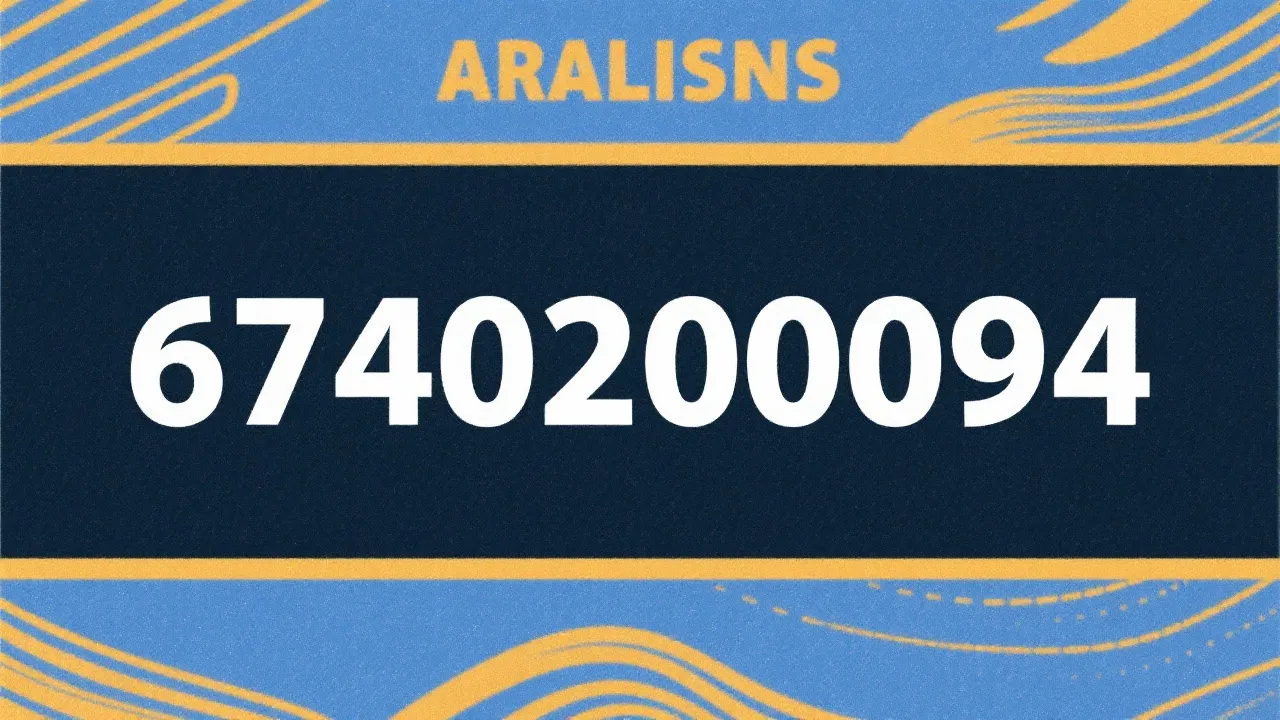Understanding the Significance of 6740200094
The number 6740200094 holds a significant place in several contexts, reflecting its broad applicability and impact. This guide explores its role across various disciplines, providing an expert analysis of how and where it influences current industry practices. Explore the diverse implications and applications of this numeric sequence as seen in technological development, data processing, and its symbolic resonance.

Introduction to Numeric Sequences and Their Impact
Numbers are more than mere figures; they represent fundamental components of our world that shape various disciplines, from mathematics to technology. The number 6740200094 is not just a random sequence but an entity that can hold different meanings and influences. In modern society, numbers often reflect elements of coding, computational algorithms, and, occasionally, symbolic or representative content specific to a field. The uniqueness of numeric sequences positions them as essential tools for interpretation and application, bridging the realms of theoretical mathematics and practical utility.
Unveiling the broader significance of numeric sequences involves delving into concepts such as prime numbers, factorials, and the Fibonacci series. Each of these areas reveals intricate patterns and relationships that govern the way we perceive numerical data. For instance, prime numbers, defined as numbers greater than 1 that cannot be formed by multiplying two smaller natural numbers, have been explored for their properties in number theory, cryptography, and computer algorithms. At a basic level, understanding these phenomena enhances our comprehension of sequences like 6740200094 and their potential roles in contemporary technological landscapes.
Applications of 6740200094 in Technology and Data Processing
In the sphere of technology, numbers like 6740200094 can form part of databases, serve as identifiers, or feature in algorithms designed for data manipulation. In data processing, unique sequences are critical for indexing, ensuring that data is stored and retrieved efficiently. These numbers are integral to systems that require precise categorization and quick access to large volumes of information. As the world becomes increasingly data-driven, the significance of numeric identifiers like 6740200094 cannot be overstated.
For example, the use of numeric sequences in identification systems, such as ISBN for books or ISSN for periodicals, emphasizes their importance. Although 6740200094 might not directly correlate with these specific sequences, it reflects a similar utility within systems where unique identification is paramount. In e-commerce, for instance, product IDs leverage such sequences to streamline inventory management, enhance user experience, and ensure accurate transactions. This reliance on numeric identifiers showcases the seamless integration of numbers into the technological frameworks we navigate daily.
The rise of big data further accentuates the importance of unique numeric identifiers. As businesses strive to harness vast quantities of information, effective data processing hinges on the ability to categorize and manage these data sets accurately. In this context, a number like 6740200094 could hypothetically represent a customer ID, transaction reference, or even a unique session number for analytics purposes. The underlying principle of assigning unique values to data entities remains crucial to ensuring integrity and coherence in data-driven applications.
Symbolic Resonance and Representation
Beyond practical applications, numbers can carry symbolic significance, drawing from historical, cultural, or contextual interpretations. While 6740200094 does not hold immediate cultural or historical resonance, the role of numbers as symbols should not be underestimated. In countless cultures, specific numbers have been ascribed meanings, forming an integral part of belief systems, art, and cultural expressions. For instance, in many Asian cultures, the number 8 is revered for its association with prosperity and good fortune, while the number 13 is often considered unlucky in Western societies.
Moreover, numbers often appear in literature and art to convey deeper meanings or themes. They can serve as metaphors, represent character traits, or signify pivotal moments in narratives. The versatility of numeric symbolism extends to various forms of media and communication, enriching our understanding of their role. When we consider the application of a number like 6740200094 within different cultural frameworks, we can speculate about its potential meanings if it were to acquire a context where numeric symbolism plays a role—in art installations, musical compositions, or digital art, for example. As storytellers, artists, and creators employ numbers, they weave complexities that elevate the notion of numeric sequences beyond their arithmetic origins.
The Role of Numbers in Communication and Information Systems
Numbers like 6740200094 often find incorporation in communication protocols, serving as addressing elements to facilitate seamless data exchange. Addressing schemes in networks rely heavily on numeric sequences to ensure that data packets reach their correct destination. This concept underscores the foundational role numbers play in the digital age, routing communications and maintaining systemic coherence. For instance, Internet Protocol (IP) addresses utilize a numeric format to define and locate devices on a network, serving as vital coordinates in the realm of online communication.
The development of such protocols emphasizes the need for complexity and scalability in numeric applications. As the number of connected devices continues to rise exponentially, engineers and computer scientists are compelled to innovate addressing systems that can accommodate ever-growing networks. The example of IPv6, which expands the potential IP address space significantly beyond its predecessor IPv4, illustrates the iterative nature of numeric approaches in communication technology. By allowing for a more extensive range of addresses, the transition propels innovations in the Internet of Things (IoT), creating a vast landscape where numbers function as integral cogs in a machinery of connectivity.
Moreover, unique numeric sequences may serve as essential parameters in software development, influencing how applications perform data retrieval or user interaction. For developers and programmers, understanding the intricacies of how numeric systems operate lays the groundwork for crafting more effective algorithms that prioritize resource efficiency and speed. As users increasingly rely on digital interfaces, even a sequence like 6740200094 can transform into a reference point for user queries, enhancing overall experience in information systems and communication devices.
Expert Insights and Perspectives
Analyzing the broad scope of numeric sequences as reflected by industry experts, one gains valuable insights into their systemic importance. Numbers such as 6740200094 exemplify how essential numeric data points have become, beyond traditional arithmetic. Industry professionals underline the necessity for these elements within software development environments and their indispensable role in coding and programming sectors. Their impact transcends individual industries, reaching into financial systems, healthcare records, and digital security, where precise numeric sequences facilitate operational mandates.
Experts in the field of computer science and data analytics continually advocate for the integration of advanced numerical frameworks to address the complexities faced in the technological domain. As the reliance on data increases, professionals emphasize further research and development of algorithms that utilize numbers effectively—addressing everything from machine learning models to cryptographic solutions. For example, in cybersecurity, numeric algorithms are fundamental in encrypting data safely, translating it into sequences that prevent unauthorized access by distorting original information representations.
Furthermore, emerging technologies such as artificial intelligence and blockchain underline the necessity for robust numeric foundations. In AI, models often leverage numeric inputs to derive patterns or predictions based on training data; the efficiency of these processes is inherently linked to how effectively sequences are processed. Meanwhile, blockchain applications depend on numeric sequences to validate transactions within decentralized networks, maintaining the integrity of digital currencies and assets. Each instance reflects the evolving capabilities of numbers as they adapt to the varying demands of technological progress.
Expert Perspective on Industrial Applications
| Application | Description |
|---|---|
| Data Processing | Used for indexing and data retrieval efficiency through unique identifiers. |
| Identification Systems | Serves as unique identifiers or codes for categorization in diverse industries. |
| Communication Protocols | Facilitates data exchange via addressing schemes and IP addresses. |
| Financial Transactions | Numeric sequences play a critical role in processing financial data and ensuring accuracy. |
| Healthcare Records | Identification numbers help maintain patient confidentiality and streamline record-keeping processes. |
| Cryptography | Utilizes numeric algorithms to encrypt sensitive data and enhance cybersecurity. |
| Blockchain Technology | Numbers underpin transaction validation processes in decentralized networks. |
| Machine Learning | Numeric models are essential for analyzing datasets and creating predictive algorithms. |
| Inventory Management | Product IDs composed of numeric sequences aid in tracking and managing stock efficiently. |
Common Questions
- What is the significance of 6740200094? – Its significance lies in its potential application across various data and technology systems, serving as an identifier or element in data handling. This numerical sequence embodies the broader framework of how numbers impact multiple sectors.
- Is there a cultural or symbolic meaning? – While this number does not currently hold a significant cultural or symbolic meaning, the role of numbers in general as symbols can vary across contexts. The exploration of its meaning could evolve based on creative applications in art or media.
- How do experts view such numeric sequences? – Experts view them as essential components in technological processes, emphasizing their role in data-related applications. The perspectives highlight their omnipresence in industries and the continuous advancements driven by numerical frameworks.
- Can numeric sequences impact personal data privacy? – Yes, effective use of numeric sequences can enhance data privacy through unique identifiers that maintain confidentiality while enabling secure data transactions and record-keeping.
- How do numeric sequences adapt to new technologies? – Numeric sequences evolve with technology by integrating into new algorithms, enhancing their utility in emerging fields like AI, blockchain, and IoT.
Conclusion: The Broader Implications
In summary, the number 6740200094 illustrates the complexity and versatility that numbers can exhibit in contemporary contexts. From data processing to symbolic potential, the diverse applications of numbers underscore their integral nature in driving forward the digital and informational advancements that define today's era. As numerical data continues to bridge gaps between abstract concepts and real-world applications, its understanding and exploration remain crucial for academic and practical undertakings alike.
The exploration of numeric sequences such as 6740200094 invites us to reflect on the multifaceted nature of numbers in our society. Whether we consider their influence on technology, data integrity, cultural symbolism, or communication strategies, the insights gleaned from such inquiries propel us toward a comprehensive understanding of not just numbers themselves, but also the intricacies of the systems they support. The growing significance of numeric sequences suggests that as we continue to navigate an increasingly complex digital environment, our comprehension of these elements must evolve and adapt, ensuring we harness their full potential for both innovation and societal growth.
Additionally, engaging with numbers prompts broader discussions encompassing issues like data ethics, privacy, and the future of technology. In a world where numerical identifiers govern much of our daily interactions, the implications reach far beyond technical applications and touch upon moral considerations that resonate through sectors such as finance, healthcare, and education. The dialogue surrounding numeric sequences highlights the responsibility carried by developers, policymakers, and users to cultivate environments that prioritize human-centric values within the realms of technology.
To conclude, the journey of understanding numbers like 6740200094 represents more than an exploration of symbols; it signifies an inquiry into the framework of our rapidly evolving society. As digits coalesce to form sequences that drive progress, foster creativity, and enhance connectivity, we remain poised at the crossroads of exploration—a journey where numbers become not merely tools, but profound connections to the world around us.










